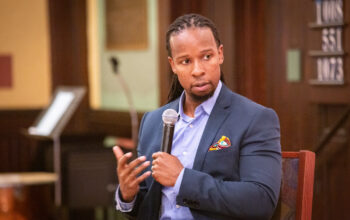In our increasingly digital age, internet communication has made talking about politics less productive than ever. Avoiding internet arguments and replacing them with face to face ones can help reduce the political polarization that afflicts our society.

I recently co-wrote an article published by Public Square Magazine and our own Brighter Dawn Newspaper voicing critiques my co authors and I have with Critical Race Theory and Dr. Ibram X Kendi’s book “How to be an Antiracist.” In the article comments section, my co-authors and I received criticisms from many readers. However, the criticisms which drew my attention the most were from a BYU professor. I disagreed with the comments left by this professor, but found a potential comment war unappealing and unproductive for both him, myself, and the community. With this in mind, I decided to contact the professor to propose a face to face (or Zoom) discussion. We met over Zoom and discussed the issues in a civil manner, and then segued into a discussion of Great War history and Europe. The meeting was successful, and I felt that I was able to better defend the points of my co-written essay and the professor was able to better illustrate his own criticisms. Needless to say, we left the discussion on a friendly note.
After my meeting ended, I reflected on why it felt successful and, perhaps more importantly, why the prospects of an online political argument were so unappealing. As I pondered the issue, I realized that online political arguments tend to encourage argumentation for the wrong reason, invite disrespectful rhetoric, and politically polarize a community away from a state of mutual respect. Unlike the usual unproductive internet exchange, the face to face meeting I had with the professor encouraged us to argue for the correct reasons, remain respectful, and put the good of community over a petty polarizing argument.
Many political arguments carried out online fail to encourage argumentation for the correct reasons, and are thus unproductive. The brevity of a digital comment makes it tempting for individuals engaging in a political comments section argument to attempt to “win” the argument by straw-manning or deliberately taking each other’s stances out of context as opposed to respectfully learning the intricacies of their opponent’s argument (and testing out the context and intricacies of their own stance). While learning an opponent’s entire stance on a political issue from several sentences in a comments section is difficult, civil arguments carried out face to face allow for an organic conversation about a political issue to take place. When one’s responses are not limited to several lines of emotionless text in a comments section, the desire to ‘win’ the argument swiftly is lessened. This is because a respectful face to face conversation allows for more points to be made, more context of one’s stance to be given, and a better defense against obvious straw manning of one’s or one’s stances being taken out of context. The objective of a political argument should not be to win, it should be to learn the context on which an opponent’s argument is predicated as well as testing the potency and deliverability of one’s own argument. If one wishes to achieve this objective, they are more likely to succeed by taking the argument off of the internet and, instead, meeting face to face.
Along with a desire to win, political arguments over the internet tend to bring out the worst rhetoric in regularly polite and rational people; one does not need to look far to find such disrespectful internet behavior. This is because a comments section allows for anonymity as well as, as was mentioned before, an unclear depiction of the individual one is commenting at. With the passionate subject of politics, a comments section being an environment with no immediate physical social consequences, and individuals with preconceived notions about who each other politically represent, it’s no surprise that internet political arguments often feature unsavory, vitriolic, and argumentative tactics designed to degrade or belittle an opponent. On the other hand, when one is arguing face to face with another, there are usually immediate external (hostility) and internal (embarrassment) consequences for unsavory tactics and rhetoric which disrupt the flow of a civil political argument; it is less likely that one will, for example, savagely belittle an opponent face to face due to self embarrassment or physical retaliation (from leaving the room to a slap across the face) from one’s opponent. Being able to see each other’s body language provides us with a vital method of communication absent from online forums: a method of discerning our partner’s mood and intent. It reminds us that we are speaking not with an abstract representation of an idea we dislike, but rather with a person who has experiences, desires, and feelings like ourselves. As such, avoiding the temptation of rhetorical virulence is far easier to achieve when one argues with another face to face over a charged political topic.
While sidelining the temptation to “win” a political argument and disincentivizing vitriolic rhetoric by meeting face to face are great ways to foster a civil and respectful political argument, they should not be thought of primarily as tools to change the opinions of one’s opponent. A civil political argument conducted through any medium is unlikely to completely change one’s political positions, especially if that debate is conducted in a comments section. As such, if the argument is civilly conducted face to face, one should approach the debate with the previously mentioned objectives of a civil political argument in mind: to learn where one’s opponent is coming from and to test the effectiveness and deliverability of one’s own argumentative stance.
The objective of political arguments should not be to ‘win,’ but rather to learn
In addition to learning from other perspectives and testing one’s own opinions and beliefs, civil, face to face argumentation can combat a destructive and prevalent modern issue: political polarization. Political polarization has existed in American political structures since the nation’s founding in the 18th century. However, in the 21st century it has become much easier to polarize oneself and one’s community due to the prevalence of the internet as a dominant medium of political information and discussion. While political opinions will differ across and within communities, polarization entails beliefs which do not recognize the complex grey area that makes up almost every political topic known to man. A failure to recognize the complexity of a political issue whilst holding onto one side of said issue is incredibly problematic for a community. When this occurs, a line is drawn in the political sand which those on each side do not dare, or are perhaps too terrified, to cross. A politically polarized community is unsustainable because, instead of individuals in a community attempting to develop respect for each other outside of politics, full political polarization allows political stances to be the only recognizable identity of community members. With political polarization being an unsustainable state for a community to be in, individuals must move towards a place of mutual respect and betterment for the community. However, with the knowledge that this is easier said than done, how can face to face political argumentation help achieve this direction?
In 2017, world class professional fighters Floyd Mayweather and Conor McGregor fought in a highly publicized and scrutinized boxing match. As is common in professional fighting, over the weeks leading up to fight night, both fighters constantly belittled each other so much that one could have believed that they were sworn mortal enemies. However, after the fight, Mayweather and McGregor shook hands and lightly embraced one another in a show of solidarity; having gone toe to toe in the ring, both had earned each other’s respect- regardless of the outcome of the fight. There is a clear lesson to be learned here.
In the same way that Mayweather and McGregor gained respect for each other through their boxing match, individuals arguing properly over a political topic face to face can become less politically polarizing for themselves as well as for those viewing the argument. As was previously mentioned, an online argument often features unsavory rhetoric and tactics while failing to fully represent either side of the argument. As such, those who civilly argue face to face gain more insight into each other’s experiences and positions and, therefore, can develop a mutual respect which transcends political polarization. More importantly, by choosing to argue with an opponent face to face, one avoids exposing those who could potentially view a polarizing, petty, and nasty internet argument to the polarizing effect themselves; if the argument is not online, then no one can view it and become radicalized, angry, or offended. Thus, while civilly arguing face to face can not only create a network of mutual depolarizing respect between opponents, it also fails to provide fuel for the fire of community damaging political polarization.
“Winning” an argument can feel good. Even utilizing vitriolic rhetoric to belittle an opponent can feel good. Arguing via the internet often encourages both the former and the latter more than it encourages civility, understanding, and mutual respect. Therefore, not only do political arguments over the internet polarize those who participate in them, they can polarize those who simply view them. The goal of a civil political argument should be not to win or belittle, but to test one’s own argument, understand the stances of one’s opponent, and to forge a friendly, polarization-destroying respect between participants. Because personal interaction between people allows for a greater grasp of the experience, emotion, and ideas behind one’s political stances, it is far more likely that these objectives can be accomplished if one meets and argues with an opponent face to face rather than over a highly limiting and depersonalized online medium. These goals of political argumentation are, of course, easier said than done. However, they are an important step in creating a better functioning political society.





This is an absolutely important discussion that needs to take place in every household and classroom.
However, our society is still learning how to navigate instantaneous communication via text.
I believe in time we will hopefully, get to a place where we can have healthy and productive conversation via short texts and tweets, but it definitely takes the right individuals to make that happen.
Perhaps we will simply be able to download emotion emojis into our senses and all parties will literally “feel” what we are actually trying to say.
Or, that may make things worse. Who knows???
Great article!